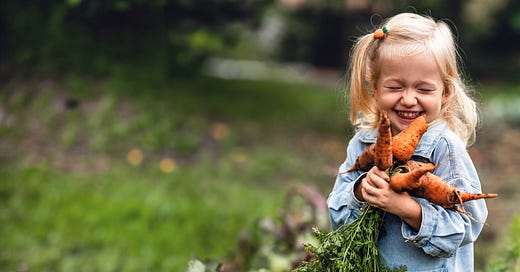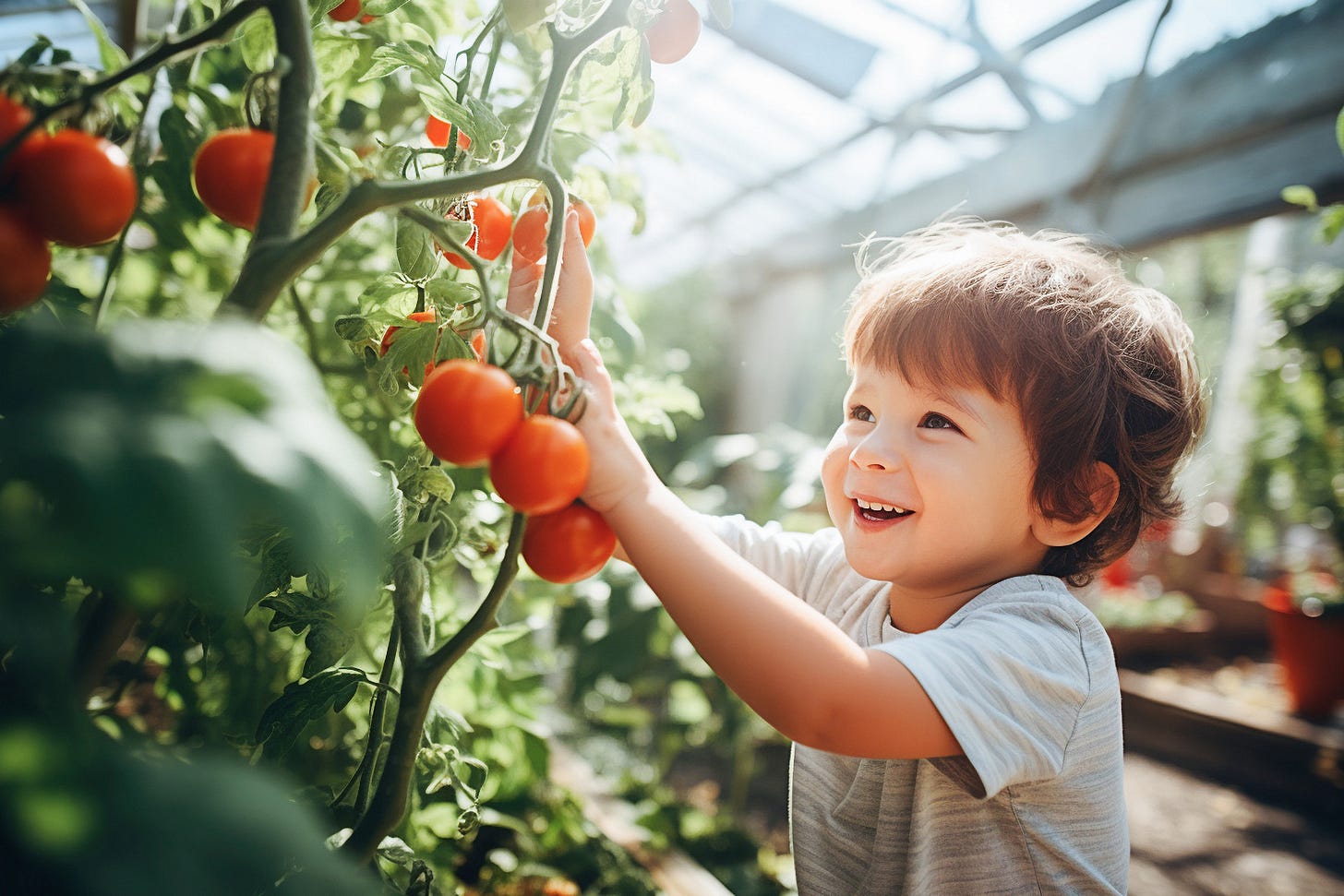Edible Elegy: What we lose when food becomes fuel
The transformation of food from a sacred gift to fuel for the body is a story fraught with unintended and chilling consequences.
The losses cannot be calculated in simple culinary terms but in relational ones as the disconnection from each other, the land, and our ancestors accumulate. Our bodies, now equated to high-performance machines, are increasingly depersonalized with a focus on what fuel best fortifies against disease and decay. Eating has become less about savouring and enjoyment and something we must maximize in the endless pursuit of wellness. How can eating be a rich sensory and relational experience when it is simply about sustenance? Such times call for an elegy to capture what has been eclipsed in our pursuit of food as fuel. What do we lose when nourishing our kids and loved ones becomes a mechanistic exchange rather than an emotional communion?
There is No Rest
Food, whose secrets for health were hidden in the folds of favourite meals, has taken on moralistic tones of good, bad, healthy, unhealthy, or clean enough to eat. Before we indulge in the sweet things in life, how many ask – did I work my body hard enough to deserve these calories? Worse still, do our children see us contemplating such matters as if food were a dangerous substance we must proceed cautiously towards?
You can’t be alarmed by food and be nourished by it at the same time.
We teach nutritional science to our kids at earlier ages, passing on the explicit belief that food is a life and death matter, and they must play a critical role in their self-care. The stakes are high, with their bodies subject to suffering with every bad food decision they make. Eating is reduced to food pyramids requiring lessons and knowledge, with veggies and fruits deified as the ultimate secret to strength and resilience. Once sweet and crunchy to the mouth, the carrot has become the key to longevity – rendering it a tasteless endeavour. Were our kids meant to directly engage in food matters with so much responsibility on their shoulders? Whatever happened to the notion that you could count on your adults to provide what you needed? The only truthful account of the impact of nutritional science is found in the research, which demonstrates it has little to no effect in changing kids’ food habits and choices.
In our pursuit of wellness, we have forgotten that what we eat is only part of the story. In the quest for life's holy grail and elixir, we no longer consider how attachment is at the core and our primary survival instinct and drive. Maslow’s hierarchy of needs led us astray – food isn’t first but human connection. The research on longevity bears this out, from the Blue Zones research where 5 of the 9 items for extended health are about relationship to self, higher power, each other, community, and so on. The Grant and Gleuck longitudinal study from Harvard followed participants for over seventy-five years and found the greatest predictor of longevity was having at least one strong, caring connection in your life. In Outliers, Malcolm Gladwell reports on the mysterious robust health of the Rosetan people despite their poor eating habits, obesity, and smoking habits. He cites how their strong community and relational bonds served as an emotional life preserver and forcefield. The key is this - when we are attached and feel safe, our nervous systems can rest to digest and use the gifts of food we have been given.
We can't be nourished from a place of alarm, obsessions, or nutritional science.
Michael Pollan argues that the rise of nutritionism and our obsessive stance on food as fuel is a marketer's dream. It makes us vulnerable to the never-ending stream of advice, diets, and findings from nutritional science that now act as our caretakers. Dietetic engineering is now the source of comfort instead of the warmth of caretakers who feed us. This reductionistic approach to counting lipids, fats, proteins, and calories distracts us from what is key. Food cannot be feared and fulfill its potential to nourish us. Nutritionism, the industrialization of food, and behavioural approaches focus on consequences and outcomes and detach us from our most basic needs. We are seduced by the quantifiable metrics that nutritional science offers and given a false sense of security that we are protected against the finality of life. We are lured into using cognitive shortcuts created by food marketers so we can choose from the never-ending array of food choices. The problem's core is that cultural foodways no longer drive us, but our alarm does. What we have gained in efficiency comes at the expense of the relational contexts and people we were meant to depend on for caretaking. Eating was never meant to be a clinical endeavour but a relational and emotional one. We need to embrace deeper sustenance, nourishing us at the most hungry place – connection.
Loss of Caring and Deepening of Connections
When we focus on food as fuel, we lose sight of each other and how to cultivate connection. Eating serves us best when it is used as an instrument of attachment. Feeding someone is more than just a nutritional event; it can be an act of caretaking. The key is this - you cannot feel cared for from a place of alarm and angst in your caretaker. No one feels nourished with declarations of “eat so you stay healthy,” or “one more bite so you don’t waste what I have given you.” We can only feel cared for when we feel the intentions and actions of someone as coming from a generous and warm place. If all eyes are on the food and whether it is the right fuel for us, then we may miss feeling the relational offer presented.
There is a persistent myth that when we eat together, our relationships are strengthened. This isn’t always the case. Sitting beside someone doesn’t mean you are connected. Being fed by someone doesn’t mean you are receptive to what they offer or trust them. Eating together can only celebrate a relationship if an attachment is worth holding onto. How we eat in each other’s presence can serve as a window into the nature of our connection. We can lose our appetite or eat ravenously with some people, but not others. Why does a child become bossy, and commanding, and hijack everyone’s attention at the table? It’s not simply about the food on the plate but the emotions that arise from being together.
Eating together aids longevity because it can bring us to rest and nourish us relationally and emotionally.
The depersonalization of food as fuel ruptures the bond between caregiver and child. It detracts from feeding and eating as being a warm and secure event. The transactional nature of the refueling of the body overshadows the kindness and caring that once gave rise to nourishing someone. The delicate dance of attachment gets overturned in favour of focusing on eating outcomes and behaviour. Breaking bread morphs into caloric intake instead of emotional communion. When emotional nourishment is stripped away from feeding, it becomes a perfunctory task that cannot foster resilience and well-being. When food is fuel, there is no room for ancestral wisdom in the care of others. The sounds of nutritional progress drown out the traditions that once anchored and nourished us.
Disconnection from Mother Nature as Our Great Provider
The food as fuel narrative severs our connection with Mother Nature as our great provider. Food offerings from the Earth become commodified, a cash crop, a transaction instead of a relational exchange. Under this approach, we fail to consider how something has given up its life so that we may be nourished. Mother Nature mourns our loss of reverence and reciprocity silently. In losing sight of who feeds us, the sacredness of this caretaking act and the gifts bestowed on us vanishes. We do not feel her gentle and generous ways of caring for us and our well-being suffers as a result. We cannot be nourished by food that appears on our table ‘by surprise’ and are rendered more relationally poorer for it.
When we are no longer aware of the relational roots that sustain us, the materialist ones fall short in closing the vulnerability gap. The story of seeds, roots, and leaves as the medicine for the body and soul is unheard, with their offerings now reduced to a cold calculus of nutritional analysis. Sterile machines hum instead of our caretakers as they calculate our inputs and outputs needed for well-being. The dance between humans and the edible world lays forgotten. Lost with this intimate connection to Mother Nature is knowledge of how to sustainably harvest for all beings, not just humans. This loss transcends the individual and permeates the fabric of our communities and cultural traditions. We lose our natural rhythms of harvest and celebration. We lose our foodways and take advantage of Mother Nature thus harming the one who cares for us all.
Our connection to the land and terroir on which we are nourished is not just a climate issue but a relational one.
We need to act as matchmakers for our children and lead them back to the land and to seeing food as a gift to be cherished. When eating is a celebration of gifts, then coercion is less needed, and we can better come to rest. When we relish in the gifts provided, we can feel safe and secure in the hands of the Great Mother who provides. It is where our bodies are made receptive to the medicines our plants and animals have offered up for our well-being.
Reclamation and Repair
There is a way to restore and regain relational richness regarding food and feeding others. We can intentionally create spaces where our body is nourished and our heart, mind, and spirit. It starts with seeing feeding as an expression of love, attunement, and vulnerable proximity. Reawakening our senses to eating starts with seeing food as something to be savoured instead of a refueling expedition for the body. We can hold the words of the poet Leon Abric in mind to guide our reclamation efforts – “Why did the immortal gods come to the table, and twice a day?” There are some pangs of hunger that food alone cannot fill.
The ultimate price we pay when food is no longer a gift is that it can become a substitute for filling the relational voids left behind. Food can either serve our togetherness or our emotional distress. The food-as-fuel approach is the surest path to separation and unrest.
What are the challenges or successes you face in ensuring is more than just fuel while caring for loved ones?
Deborah MacNamara, PhD, is the author of Nourished:Connection, food, and caring for our kids (and everyone else we love), and Rest, Play, Grow. She is the Director of Kid’s Best Bet Counselling Center, and on Faculty at the Neufeld Institute. To read more see deborahmacnamara.com.






